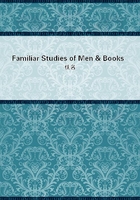
第88章
And as his voice had something of the trumpet's hardness, it had something also of the trumpet's warlike inspiration. So Randolph, possibly fresh from the sound of the Reformer's preaching, writes of him to Cecil:- "Where your honour exhorteth us to stoutness, I assure you the voice of one man is able, in an hour, to put more life in us than six hundred trumpets continually blustering in our ears." (1)
(1) M'Crie's LIFE OF KNOX, ii. 41.
Thus was the proclamation made. Nor was it long in wakening all the echoes of Europe. What success might have attended it, had the question decided been a purely abstract question, it is difficult to say. As it was, it was to stand or fall, not by logic, but by political needs and sympathies. Thus, in France, his doctrine was to have some future, because Protestants suffered there under the feeble and treacherous regency of Catherine de Medici; and thus it was to have no future anywhere else, because the Protestant interest was bound up with the prosperity of Queen Elizabeth. This stumbling-block lay at the very threshold of the matter; and Knox, in the text of the "First Blast," had set everybody the wrong example and gone to the ground himself. He finds occasion to regret "the blood of innocent Lady Jane Dudley."
But Lady Jane Dudley, or Lady Jane Grey, as we call her, was a would-be traitoress and rebel against God, to use his own expressions. If, therefore, political and religious sympathy led Knox himself into so grave a partiality, what was he to expect from his disciples?
If the trumpet gave so ambiguous a sound, who could heartily prepare himself for the battle? The question whether Lady Jane Dudley was an innocent martyr, or a traitoress against God, whose inordinate pride and tyranny had been effectually repressed, was thus left altogether in the wind; and it was not, perhaps, wonderful if many of Knox's readers concluded that all right and wrong in the matter turned upon the degree of the sovereign's orthodoxy and possible helpfulness to the Reformation. He should have been the more careful of such an ambiguity of meaning, as he must have known well the lukewarm indifference and dishonesty of his fellow-reformers in political matters. He had already, in 1556 or 1557, talked the matter over with his great master, Calvin, in "a private conversation;" and the interview (1) must have been truly distasteful to both parties. Calvin, indeed, went a far way with him in theory, and owned that the "government of women was a deviation from the original and proper order of nature, to be ranked, no less than slavery, among the punishments consequent upon the fall of man." But, in practice, their two roads separated. For the Man of Geneva saw difficulties in the way of the Scripture proof in the cases of Deborah and Huldah, and in the prophecy of Isaiah that queens should be the nursing mothers of the Church. And as the Bible was not decisive, he thought the subject should be let alone, because, "by custom and public consent and long practice, it has been established that realms and principalities may descend to females by hereditary right, and it would not be lawful to unsettle governments which are ordained by the peculiar providence of God." I imagine Knox's ears must have burned during this interview. Think of him listening dutifully to all this - how it would not do to meddle with anointed kings - how there was a peculiar providence in these great affairs; and then think of his own peroration, and the "noble heart" whom he looks for "to vindicate the liberty of his country;" or his answer to Queen Mary, when she asked him who he was, to interfere in the affairs of Scotland:- "Madam, a subject born within the same!" Indeed, the two doctors who differed at this private conversation represented, at the moment, two principles of enormous import in the subsequent history of Europe. In Calvin we have represented that passive obedience, that toleration of injustice and absurdity, that holding back of the hand from political affairs as from something unclean, which lost France, if we are to believe M. Michelet, for the Reformation; a spirit necessarily fatal in the long run to the existence of any sect that may profess it; a suicidal doctrine that survives among us to this day in narrow views of personal duty, and the low political morality of many virtuous men. In Knox, on the other hand, we see foreshadowed the whole Puritan Revolution and the scaffold of Charles I.
(1) Described by Calvin in a letter to Cecil, Knox's Works, vol. iv.